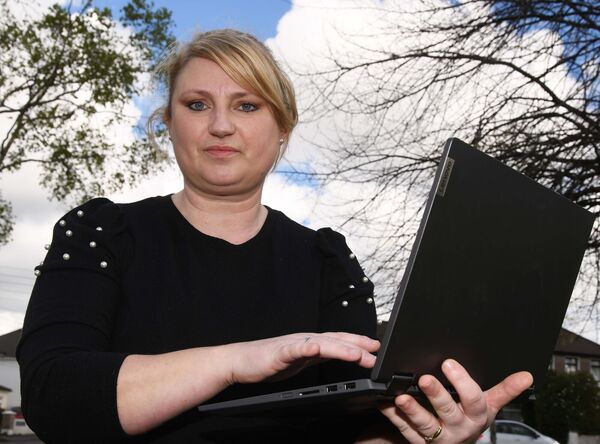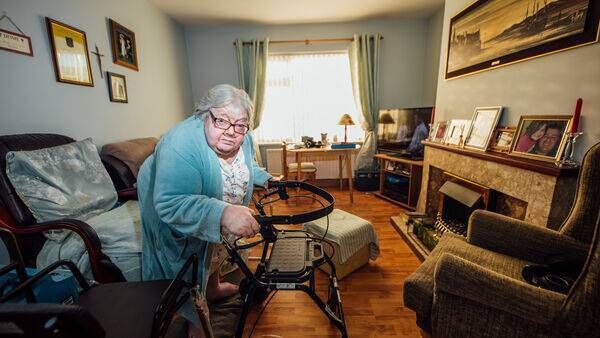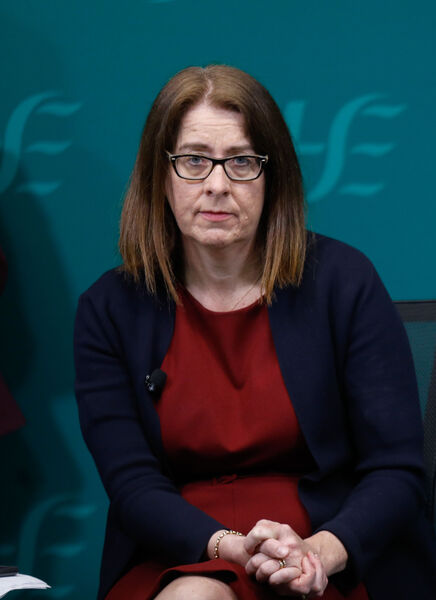The crisis in healthcare is too often only discussed in terms of hospitals, but for almost 5,000 mainly elderly people the crisis is in their homes.
A severe shortage of carers is leaving these people without anyone to deliver their funded homecare packages, leaving many of them in bed all day.
Carers who spoke to the said there was nothing complex about why this crisis was happening.
“Change would have to mean the agencies paying more to the carers, and better conditions for the healthcare workers and more attention to the families,” said Cork-based carer Louise Murphy bluntly.

She and others in the industry point to low wages, long hours, and insecure working conditions pushing the mainly female workforce to desert the profession.
This has an immediate impact on people who rely on carers to essentially have a little dignity in their day.
In Clare, 74-year-old Rita Parrott was granted a homecare package but could not get a carer for the full hours.
Now back on track, she told the in January: “I’m not getting those 14 hours. A girl came in and said to me, ‘I’m sorry Rita, the carers just aren’t there love’, straight out. It’s terrible.”

Across the Cork/Kerry region in March there were 800 people waiting on a carer. Most are elderly as over-65s are entitled to home support hours through the HSE.
The HSE packages are delivered by their own staff or carers working for private companies under contract.
There were 5,253 HSE healthcare support assistants by the end of March working a range of hours weekly.
Among the 40 private “tier 1 approved providers” staff numbers vary. Home Instead Senior Care has “over 4,500” carers, according to its website, while Family Carers Ireland said it has 1,000 professional carers in its homecare division.
Bluebird Care could not say exactly how many staff it has in Ireland as it is a franchise business, but it is “actively recruiting”.
Rose Long has been a professional carer for seven years with the HSE, private companies, a management company, and directly with families.
“There is such a big difference in the way you are treated,” she said.
During one private contract she was aware the HSE was paying €28/hr to the company but she was earning €11/hr before tax.
In her experience there is a high turnover of staff across private companies.
“Someone could have four different carers in the space of a year,” she said.
“If a carer is coming in and showering you, and getting you dressed, and helping you go to the toilet, you want to know it’s the same person every day or someone you are comfortable with
Families can be reluctant to complain, she has found.
“Generally people are thankful they have a carer … and they are scared of losing the service,” she said.
HSE Cork/Kerry has been recruiting since January and said by March it had 100 people at pre-employment stage with a “respectable number of applications”.
“However we are also experiencing a significant decrease in staffing numbers for healthcare support assistants across Cork and Kerry,” a spokeswoman said.
It is not good news the HSE is struggling. Its carers enter the pay scale at €29,562 to €38,100 — paid according to hours.
Travel and subsistence rates are paid in accordance with the HSE’s National Financial Regulations.
“Mileage claimed is dependent on location/base and spread of clients within a geographical area and staff are assigned in such a way as to minimise the amount they travel in so far as possible,” a spokeswoman said.
HSE chief operations office Anne O’Connor has described the situation as “challenging”.

“The challenge is that people are trying to move into HSE caring roles from the private sector and from private nursing homes,” she said.
“In the round, that doesn’t really help us; we end up with challenges then in our [private] nursing homes.
“We have to be careful we are not taking many people away. Obviously, people are entitled to apply for jobs wherever they want but the overall picture of caring in Ireland is still very, very challenging.”
Ms Murphy has also worked for the HSE, directly with families and private companies, and said a current contract with a private provider only started including mileage in the last month as the staff shortages bite.
“The carers are getting €11.50 an hour and then they are taxed on top of that, they don’t get any mileage, and really it’s absurd
“It’s a physically demanding job, a mentally demanding job as well. It is very rewarding but it is hard as well.”
A carer for five years, she is starting a pre-nursing course but is loath to leave her clients. She is currently doing about 40 hours a week between different contracts.
“It really is about keeping people in their own house and where they can have their family around them,” she said. “There’s job satisfaction in helping people in their daily lives.”
She is frustrated by the high staff turnover, saying: “When I was doing the course, it is drilled into you about individualised and person-centred care, and how important it is. And that’s not being done when you are in the job.”
Both Ms Long and Ms Murphy have been hired directly by families through online platform Home Care Direct (HCD).
Founder Michael Harty previously ran a private company and is former chair of Home & Community Care Ireland, the representative body for homecare providers.
“There is no shortage of carers; there is a shortage of people who want to work for the minimum wage
Publicly available HSE tender documents indicate mileage can be built-in by providers.
“The providers put in a cost for carer transport costs. Why aren’t they paying that over? Basically because they don’t have to do so,” Mr Harty said.

Carers with HCD pay a commission, getting Garda vetting and accounting taken care of in return, with the ability to set hours and salary directly with families.
“The topline economics of the homecare industry in Ireland is the agencies roughly are charging €27 an hour and they are paying carers around €12 an hour
“What we are trying to do is ensure that more of those funds find their way to carer’s pockets.”
Ms Murphy explained her preference would be options like this alongside properly-paid agency work as not every client is interested in hiring carers directly.
“The platform has really empowered us as carers. I have gone from €11.50/hr to €20/hr,” she said.
“It is a big difference, there is great support there and that is the way it should be.
“At the moment you have a middle man and the middle man is squeezing the life out of homecare in the country.”
HSE financial statements for 2020 show that, among the larger companies, Home Instead Senior Care received €58.3m, Bluebird Care €33m, and Irish Homecare €12.8m.
Despite the pressures of lockdowns, 17.5m hours of homecare were delivered that year, with campaigners calling for more hours to meet the rising demand.
Home Instead Senior Care is a franchise operator owned by Home Instead Holding AG in Switzerland. The original franchise company is in the US.
A spokeswoman for the Irish head office said it did not wish to comment for this story.
The Swiss company’s Irish subsidiary, Clinical Home Care Services Ltd, acquired all the share capital of Wexford Senior Care Ltd in January last year for €2.6m, according to financial statements filed for Home Instead Franchising Ltd.
Home Instead in Britain advises potential franchisees they will see “sustained growth year on year”.
It says: “We would expect an established office to achieve an operating profit (before franchise owner earnings) of c. 15-20%.”
At Bluebird Care in Ireland, two directors of the franchise business shared payments of €148,253 in 2020, according to financial statements.
Carers’ wages vary between individual franchises, a spokeswoman said, adding: “We are proud to offer above-market rates to our valued staff members in addition to a host of other benefits.”
Mileage payments are given “where applicable that are in line with sector norms”, she said without specifying an amount.
If a carer’s client is in hospital, they try to reassign her to other clients, she said.
Family Carers Ireland, more well-known for supporting people who care for their own relatives, also offer a professional carers service and received €7.2m in 2020 from the HSE.
Sean Dillon, their head of home support services, said hours allocated by the HSE can vary or cease if a client goes into a nursing home or hospital.
“This results in a very precarious working arrangement for both employer and employee, he said.
“Homecare workers gravitate towards the much more secure employment settings of nursing homes or to the HSE, where they are offered secure contracts of employment”
Mr Dillon said carers received extra for Sundays and bank holidays with paid sick leave, and maternity and paternity leave, but added that exact hourly rates are commercially sensitive.
Carers are only paid for travel “when the HSE approve it, which is extremely rare” he said.
In his experience, “despite paying such expenses to homecare workers directly employed by the HSE, [it] regularly refuses to pay other providers for travel.”
The organisation is working with the HSE to introduce a travel support scheme.
Across the sector, a report from University College Dublin found “public funding received by private providers increased from €3m in 2006 to €176m in 2019”.
The authors said homecare was moving from non-profit or religious providers to commercial entities, supported by government policy. For example, families who opt for organised care can get income tax relief at their top rate of tax rate as an incentive.
Published in December 2020, written by Julien Mercille and Nicholas O’Neill, found the industry has become commercialised with the power to lobby for support.
Just last month a new grouping of voluntary providers and commercial companies joined under the banner of Home Care Providers Alliance.
The report also found a lack of access for families to personal budgets, known as the “consumer-directed homecare scheme”.
It allocates a certain amount of money to families to spend on whatever type of care they feel is right.
Mr Harty said these are already common in Britain and Australia.
“Personal budgets are not suitable for all situations, but it is fantastic to have them there. They are probably the quickest way to address the carer shortage we have at the moment,” he said.
“The simple fact that choice is there puts a huge amount of pressure on agencies to ensure they are giving value-added for the family, and that they are treating carers fairly”
His company is already a supplier of personal budget care through the HSE to the disability sector, but this is not available for older people, he said.
Over the horizon are developments around a statutory homecare funding scheme, which will mean families could get funding for homecare in the same way people can for nursing homes.
However, without rapid recruitment of carers the scheme would appear to be in trouble before it starts.
“I love my job,” Ms Long said. “If I can work less and give a better quality of service to somebody and get paid more so I can still have a good work/home balance, then that is obviously the way you go.”
